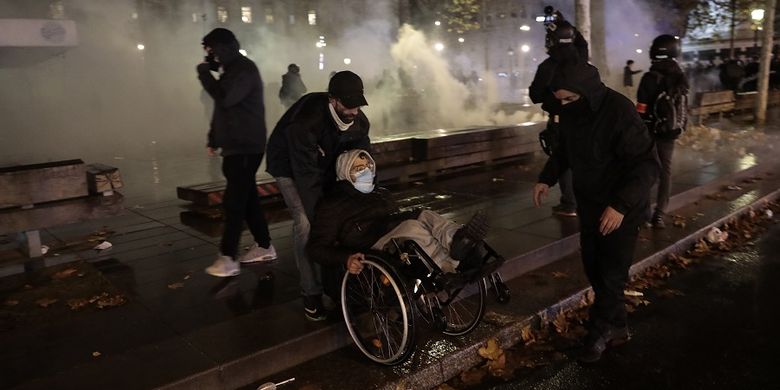The case of the pensioner from Gemnden (district Main-Spessart) moved many people: The 92-year-old had suffocated his severely demented wife because he was overwhelmed with her care. A court sentenced the man to suspended sentence for manslaughter. According to many observers, the process highlighted the number of family carers.
Gnter Schuhmann is someone who knows the nursing situation well. The 60-year-old is a trained nurse. As head of the palliative academy of the Juliusspital Foundation in Wrzburg, he has been taking care of the further training of people who work in the palliative and hospice sector since 2001. In the interview he talks about ways to help relatives and demands more money for care.
A 92-year-old suffocates his wife because he was overwhelmed with her care. Is that an isolated case?
Gnter Schuhmann: I only know the case from the media. Killing the woman shows how desperate the man must have been. And this desperation is not an isolated incident. The number of relatives who care for their father, mother or partner around the clock and for years to come and have little or no relief is quite large. They give everything, but at some point these people’s batteries are empty.
What support do caregivers need?
Schuhmann: Both the extent and the duration of the care are usually not predictable. It would be important that caring relatives inform themselves in good time about possible help and relief, for example through care advice. The employees of the outpatient care services can support the relatives with personal care, among other things. Unfortunately, however, her working day is so tight that there is hardly any time to talk to the relatives or to listen to them. That’s not a reproach, I can see that. The system does not provide for this empathy. For working people, the working day usually ends after eight hours. For the daughter who cares for her demented father, it lasts 24 hours. Inhuman things are often expected.
There are social stations everywhere. Many voluntary initiatives also offer support. It seems that many people find it difficult to ask for help. Why?
<!–
Schuhmann: The reasons are very individual. Many relatives find it difficult to admit to themselves that they can no longer manage the care on their own. It is more common to hear from older couples that they promised to look after each other at home until death. If this leads to excessive demands, they perceive this as failure and are ashamed of themselves. Sometimes the person in need of care also refuses outside help. Becoming aware of this situation and getting professional help is sometimes a big hurdle. I hear from families who ask nurses at the welfare center not to park their car in front of the house, but to park it separately. So that the neighbors don’t notice.
Many older people also worry about money.
Schuhmann: The financial factor plays a big role for many people. What does the care cost? What of this does the long-term care insurance take over? In many cases it is simply a lack of knowledge about the available help.
“Care must be worth more to us – ideally and financially.”
Gnter Schuhmann, care expert–What would help?
Schuhmann: As banal as it sounds: care must be worth more to us, both ideally and financially. The nursing staff in the inpatient and outpatient care facilities would have to be increased significantly so that the employees do not burn out so that they can take time for the people entrusted to them. I know that is a pious wish.
Is it just the money?
Schuhmann: It is also due to the image that the care sector now has. Even if the job were better paid, there is currently a lack of people who would like to do it. But ultimately, money does play a big role. In order to repair the car, we are quickly prepared to pay 100 euros for the workshop hour. On the other hand, we are stingy when it comes to nursing and health care costs. Everyone is hoping for fully comprehensive coverage from health and care insurance companies, but that will never be enough.
Especially since the need for care in society is increasing …
Schuhmann: Hopefully we will be more open to help. Also that we better prepare for old age. Issuing a patient decree or a health care proxy would be a first step. Have you already signed one?
No not yet. I think there is still time.
Schuhmann: I would strongly recommend it to you. We all hope to grow old as healthy as possible. But that’s not how life works. One should consider early on where and how one would like to spend old age. There are couples who, as retirees, move to places where they have spent nice vacations, but are far away from their familiar social surroundings. This may work as long as both partners are healthy. However, if one of them becomes a need for care, the other is also threatened with isolation. Friends, acquaintances, neighbors who help each other, that would be a good basis. But they don’t come by themselves, we have to take care of them early on.
And what can politics do?
Schuhmann: Significantly better financial resources are required so that the framework conditions in nursing become better. Then more people would certainly choose this profession again. But I also see positive developments for those in need of care and relatives. It is good that inpatient care facilities are being built not only in cities, but also in rural areas. This makes it easier for one or the other to move or separate from their partner, because one is not completely torn from the familiar environment and visits are possible at any time. It would be important for family carers to expand the range of places available for day care, short-term care and preventive care in the area as well. So that relief is possible at short notice.
It would help many older people if someone did a purchase or helps with the bureaucracy.
Schuhmann: These low-threshold offers are also important; they help to relieve the elderly.
–


